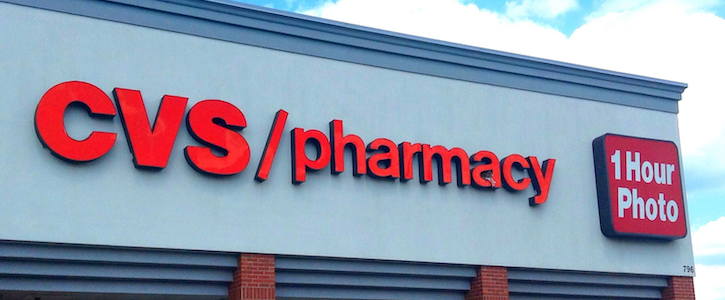AMA Says CVS-Aetna Merger Will Hurt Patients
The U.S. Department of Justice approved the merger between CVS Health and Aetna this week.

CVS Health and Aetna have received the green light to go ahead with their $69 billion merger. Photo has been cropped and resized. Courtesy of Mike Mozart of TheToyChannel and JeepersMedia on YouTube, Flickr.
When the U.S. Department of Justice (DOJ) announced that it had approved the merger of CVS Health and Aetna with conditions yesterday, the healthcare landscape seemed to have changed. With the government’s blessing, two of the nation’s largest healthcare companies — a retail, pharmacy and wellness giant and a key insurer — had joined forces, sparking concerns that competition could take a blow.
But the American Medical Association (AMA) was particularly quick and strict in issuing its statement against the union. Its president, Barbara L. McAneny, M.D., praised the DOJ for requiring the new entity to divest Aetna’s Medicare Part D prescription drug plan business for the $69 billion merger to take effect. But she said that action wasn’t enough.
>> READ: What Do Mergers and Acquisitions Mean for Healthcare’s Digital Transformation?
“Patients are better served by promoting competitive healthcare markets,” McAneny said. “The AMA is committed to ensuring that competition in healthcare is not compromised.”
The AMA head noted that her organization had rallied to convince the DOJ that “the merger would harm patients.” Going forward, she added, federal and state regulators should monitor the effects of the merger surrounding pharmaceutical benefit managers, health insurance and retail and specialty pharmacy.
Healthcare is undergoing a wave of consolidations, from hospitals and health systems to major insurers and pharmacy companies. The fervor has even attracted tech giant Amazon, which gobbled up the online pharmacy company PillPack earlier this year. There is also plenty of talk about Walmart buying the payer powerhouse Humana.
These sorts of mergers and acquisitions have riled up some healthcare insiders, anti-trust activists and other skeptics. The American Antitrust Institute, for instance, claimed in March that the CVS-Aetna merger would “trigger a fundamental restructuring of the U.S. healthcare system.”
But proponents have argued that such deals would improve efficiencies, cut costs, improve care and ultimately help repair a healthcare system that many consider broken.
Representatives for CVS Health and Aetna didn’t immediately respond to requests for comment.
A few days ago, in honor of Health IT Week, the executive who oversees HIMSS Analytics described the rapidly changing health-tech market to reporters, noting that the CVS-Aetna merger would result in a company that could “influence individual behavior through retail” and would result in “significant disruption in the provider networks.”
The DOJ has been looking into the CVS-Aetna pact since shortly after it was announced last December. It had filed a complaint that alleged decreased competition would result in inferior services and higher costs for 6.8 million Medicare Part D members.
But the settlement announced yesterday satisfied regulators, according to the DOJ.
“The divestitures required here allow for the creation of an integrated pharmacy and health benefits company that has the potential to generate benefits by improving the quality and lowering the costs of the healthcare services that American consumers can obtain,” Assistant Attorney General Makan Delrahim, who works for the DOJ’s antitrust arm, said in a statement.
What the CVS-Aetna deal will ultimately mean for patients, pharmacies, payers, hospitals and health system remains to be seen. The AMA, however, isn’t backing down from future fights.
“We will continue to examine proposed healthcare mergers as they arise and take every opportunity to challenge those that are detrimental to the patients we serve.”
UPDATE: A spokesperson for Aetna responded with a link to a joint press release, which touted the merger as a means to offer better care at lower costs. CVS Health also promoted the union’s potential as it relates to tech, data and analytics.
Get the best insights in healthcare analytics directly to your inbox.
Related
American Antitrust Institute Argues Against CVS-Aetna and Cigna-Express Scripts Deals
DOJ Requests More Info on CVS-Aetna Mega-Merger
CVS Looks to Lower Patient Drug Costs with New Digital Tools
Telehealth faces a looming deadline in Washington | Healthy Bottom Line podcast
February 12th 2025Once again, the clock is ticking on waivers for telemedicine and hospital-at-home programs. Kyle Zebley of the American Telemedicine Association talks about the push on Congress and the White House.